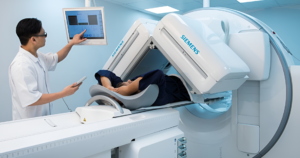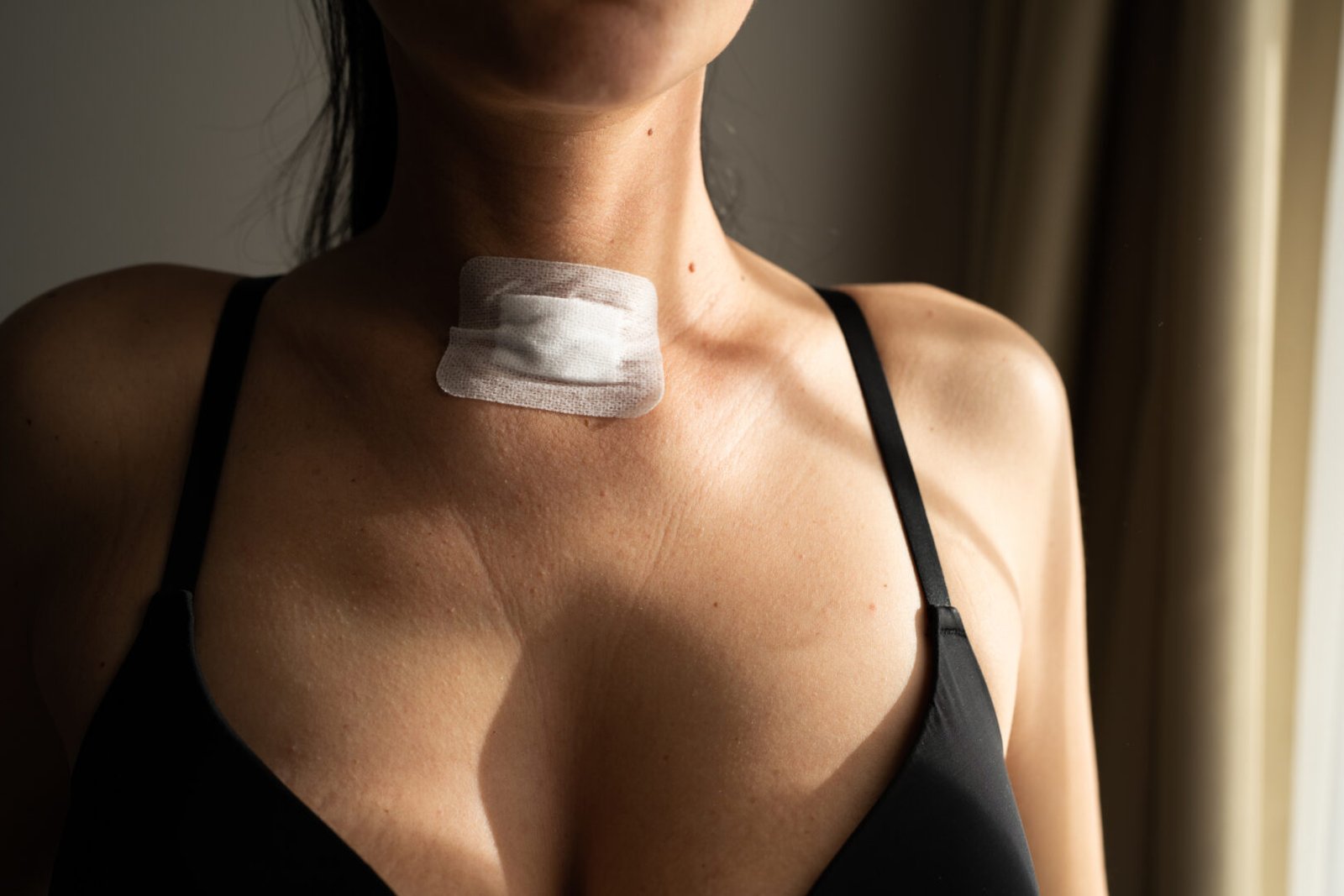Keto Diet for Thyroid Cancer: New Study, New Possibilities
The keto diet for thyroid cancer has emerged as an important potential natural healing method, offering hope for patients seeking alternative treatments.
Thyroid cancer is the most common malignancy of the endocrine system and the ninth most common cancer globally. Differentiated thyroid carcinoma (DTC), which includes papillary thyroid carcinoma (PTC) and follicular thyroid carcinoma (FTC), makes up approximately 90% of thyroid malignancies.
Patients with radioiodine-refractory differentiated thyroid carcinoma (RAIR-DTC) face significant challenges.
About 5-15% of those with DTC develop RAIR-DTC, which does not respond to conventional radioactive iodine treatment. This resistance leads to a poor prognosis, with a 10-year survival rate of around 10%. Consequently, new therapeutic approaches are urgently needed.
A new 2024 study highlights the potential of the ketogenic diet to improve outcomes for RAIR-DTC patients. Researchers at Zhejiang Cancer Hospital found that the keto diet, which increases levels of the ketone body acetoacetate (AcAc), might enhance the effectiveness of radioiodine therapy and suppress tumor growth.
This finding opens new avenues for RAIR-DTC treatment and underscores the potential of dietary interventions in cancer management.
In this article, we’ll explore how the ketogenic diet works, the scientific evidence supporting its use for thyroid cancer, and practical tips for patients interested in incorporating this diet into their treatment plan. By understanding these aspects, patients and caregivers can make informed decisions about their health and treatment options.
Researchers at Zhejiang Cancer Hospital found that the keto diet, which increases levels of the ketone body acetoacetate (AcAc), might enhance the effectiveness of radioiodine therapy and suppress tumor growth.
Understanding Thyroid Cancer and RAIR-DTC
Thyroid Cancer Overview
Thyroid cancer is the most common malignancy of the endocrine system and ranks as the ninth most common cancer overall. It primarily involves the thyroid gland, a butterfly-shaped gland located at the base of the neck.
Differentiated thyroid carcinoma (DTC) is the most prevalent type of thyroid cancer, accounting for about 90% of all cases. DTC includes two main subtypes: papillary thyroid carcinoma (PTC) and follicular thyroid carcinoma (FTC).

Papillary thyroid carcinoma (PTC) is the most common subtype, known for its slow growth and high treatability. Follicular thyroid carcinoma (FTC), while less common, also typically has a good prognosis when detected early. Both PTC and FTC are identified based on specific histopathological criteria, which help in determining the appropriate treatment plan.
Challenges of RAIR-DTC
Radioiodine-refractory differentiated thyroid carcinoma (RAIR-DTC) represents a significant clinical challenge. In the United States, approximately 5-15% of patients with differentiated thyroid cancer (DTC) develop RAIR-DTC.
Among those with metastatic DTC, about 60-70% eventually become refractory to radioiodine therapy. This condition means that the cancer does not respond to conventional radioactive iodine treatment, which is a standard therapy for thyroid cancer.
The resistance to radioiodine significantly impacts prognosis and treatment strategies. Patients with RAIR-DTC have a much lower survival rate compared to those whose cancer remains responsive to radioiodine.
The 10-year survival rate for RAIR-DTC patients drops to around 10%, highlighting the urgent need for new therapeutic approaches. Understanding the prevalence and challenges of RAIR-DTC is crucial for improving patient outcomes and developing effective treatments.

Importance of Finding New Therapeutic Approaches
Given the poor prognosis associated with RAIR-DTC, finding new treatment strategies is essential. Traditional therapies often fall short for these patients, necessitating innovative approaches.
Recent research, such as the study conducted by Zhejiang Cancer Hospital, offers hope by exploring alternative treatments like the ketogenic diet.
This study’s findings suggest that dietary interventions, particularly the ketogenic diet, may provide significant benefits for RAIR-DTC patients. By increasing the levels of acetoacetate (AcAc), a ketone body, the ketogenic diet could enhance the effectiveness of existing treatments and improve patient outcomes.
As we dig into the potential of the keto diet for thyroid cancer, it becomes clear that exploring such innovative strategies is vital for those battling this challenging condition.
Finding new treatment strategies is essential, as traditional therapies often fall short for these patients.
Recent research now offers hope for the ketogenic diet as an alternative treatment.
Practical Tips for Adopting the Keto Diet for Thyroid Cancer
Incorporating a ketogenic diet into your treatment plan can offer multiple benefits. This diet may enhance the effectiveness of radioiodine therapy, suppress tumor growth, and complement traditional cancer treatments.
By increasing levels of acetoacetate (AcAc), the keto diet improves the cancer cells’ ability to absorb radioiodine, making treatments more effective. Moreover, its antitumor effects, including reduced cell proliferation and increased apoptosis, help control cancer spread.
Getting Started with the Keto Diet
Understand the Basics: The ketogenic diet focuses on high-fat, moderate-protein, and low-carbohydrate foods. The typical macronutrient ratio is about 70-80% fat, 10-20% protein, and 5-10% carbohydrates. This ratio helps your body enter and maintain ketosis.
Read: How Many Carbs a Day on Keto? – Your Ultimate Guide
The typical macronutrient ratio is about 70-80% fat, 10-20% protein, and 5-10% carbohydrates. This ratio helps your body enter and maintain ketosis.
What to Eat on the Keto Diet

High-Fat Foods:
- Avocados
- Nuts, flax seeds
- Butter, coconut oil
- Fatty meat and fish like salmon and mackerel
- Cheese and full-fat dairy products

Moderate-Protein Foods:
- Meat and poultry
- Eggs
- Fish and seafood

Low-Carbohydrate Vegetables:
- Leafy greens (spinach, kale)
- Cruciferous vegetables (broccoli, cauliflower)
- Zucchini and bell peppers
Avoid High-Carbohydrate Foods:
- Sugary foods and beverages
- Grains and starches (bread, pasta, rice)
- High-carb fruits (bananas, apples)
- Root vegetables (potatoes, carrots)
Ensuring Nutritional Balance

Stay Hydrated: Drink plenty of water throughout the day. Staying hydrated helps your body function optimally and can ease the transition into ketosis.
Monitor Electrolyte Levels: When starting the keto diet, your body may excrete more sodium, potassium, and magnesium. Ensure you get enough electrolytes by eating foods rich in these minerals or considering supplements if necessary.
Plan Your Meals: Planning your meals can help you stick to the keto diet and ensure you get a variety of nutrients. Include a balance of fats, proteins, and low-carb vegetables in your meals.
Track Your Progress: Keep track of your daily macronutrient intake to ensure you are maintaining the correct ratios. Many apps and online tools can help you monitor your diet and stay on track.
Practical Tips for Success
Start Slowly: Transition into the keto diet gradually to allow your body to adjust. Start by reducing your carbohydrate intake and increasing healthy fats.
Listen to Your Body: Pay attention to how your body responds to the diet. It’s normal to experience some initial side effects like fatigue or headaches, known as the “keto flu.” These usually pass within a few days.
Seek Support: Join online forums or local support groups for individuals following the keto diet. Sharing experiences and tips with others can provide motivation and make the transition easier.

Key Takeaways
Enhanced Radioiodine Uptake: The keto diet increases levels of acetoacetate (AcAc), which enhances the expression of sodium iodide symporter (NIS) and thyroid-stimulating hormone receptor (TSHR) in thyroid cancer cells. This improvement boosts the cancer cells’ ability to absorb radioiodine, making the treatment more effective.
Suppressed Tumor Growth: AcAc, produced during ketosis, has significant antitumor effects. It inhibits cell proliferation, migration, and invasion while promoting apoptosis (programmed cell death) in thyroid cancer cells. These effects collectively help in controlling the spread of cancer.
Complementary Therapy: The ketogenic diet can complement traditional cancer treatments. By enhancing the effectiveness of radioiodine therapy and providing additional antitumor benefits, the keto diet offers a multifaceted approach to managing radioiodine-refractory differentiated thyroid carcinoma (RAIR-DTC).
Practical Implementation: Starting the keto diet involves consulting with healthcare providers, understanding the basic principles of the diet, and focusing on high-fat, moderate-protein, and low-carbohydrate foods. Planning meals, staying hydrated, and monitoring electrolyte levels are essential for maintaining nutritional balance and ensuring the success of the diet.
Positive Research Findings: A recent study by Zhejiang Cancer Hospital highlighted the potential of the keto diet as a new therapeutic strategy for RAIR-DTC. The study found that the ketogenic diet significantly elevated AcAc levels in the serum, suppressed tumor growth, and improved the expression of NIS and TSHR without affecting body weight. This suggests that dietary interventions could improve treatment outcomes for patients battling this challenging form of thyroid cancer.
Final Thoughts
The keto diet for thyroid cancer presents a promising approach to improving treatment outcomes for patients, particularly those with radioiodine-refractory differentiated thyroid carcinoma (RAIR-DTC). By enhancing the effectiveness of radioiodine therapy and providing significant antitumor benefits, the ketogenic diet offers a multifaceted solution for this challenging condition.
Research from Zhejiang Cancer Hospital underscores the potential of acetoacetate (AcAc) in boosting radioiodine uptake and suppressing tumor growth. These findings highlight the importance of exploring dietary interventions as complementary treatments.
Incorporating the keto diet can be a proactive step toward better managing thyroid cancer. With careful planning and monitoring, this dietary approach may provide important additional support alongside conventional therapies, offering hope for improved prognosis and quality of life.
References
- Metabolomics reveals the implication of acetoacetate and ketogenic diet therapy in … thyroid carcinoma. May, 2024, The Oncologist
- Global Cancer Statistics: GLOBOCAN Estimates of Incidence and Mortality Worldwide… American Cancer Society Journals
- Radioiodine refractoriness score: A multivariable prediction model for postoperative radioiodine-refractory differentiated thyroid carcinomas. Cancer Medicine
- Scoring system and a simple nomogram for predicting radioiodine refractory differentiated thyroid cancer: a retrospective study. EJNMMI Research
- Management of Progressive Radioiodine-Refractory Thyroid Carcinoma: Current Perspective. Cancer Management and Research
Keto PowerFlax Baking Mix: Keto & So Much More!

- Commercial Bakeries: you can easily produce delicious flax-based keto-friendly products which are clean label, high protein, high fiber and plant-based!
- Works with your current equipment and baking processes.
- Recipes provided on all bulk orders, with ongoing customer support
- Worldwide shipping
- Get in touch with us today!

What to Read Next
- How Many Carbs a Day on Keto? – Your Ultimate Guide
- Mental Health, Mitochondria & Keto: Feel Better Naturally
- The Chronic Fatigue Syndrome Diet (Keto For CFS)
- Is Keto an Anti-Aging Diet? What the Science Says
- The Keto Diet for Diabetes: A Science-Backed Guide
- Road Trip Food Planner for Keto Dieters



